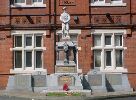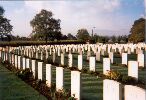
Newton-le-Willows and
Earlestown War Memorial

| OTHER WARS |
 |
Newton-le-Willows andEarlestown War Memorial |
 |
| The
Great War Roll of Honour |
|||||||||||||||||||||||||
Private Fred Howard was the son of Mr. A.and Mrs. Elizabeth Howard of 153, Crow Lane East, Newton-le-Willows (or "Newtonly Willows" as it was written by the recruiting officer in Liverpool in his attestation form in November 1914). The form only lists his mother as next-of-kin so his father may already have been dead. By trade Fred was a printer's machinist, having served his time with Messrs. McCorquodale and Co. at Newton. Prior to enlisting he was at the printing works of Messrs. Bibby, of Liverpool.
His "burnt papers" give his height as five feet six
inches and his weight a one hundred and thirty three pounds. He had a sallow
complexion, grey eyes and dark brown hair. His religion is listed as Church
of England. He had three sisters - Mary, Annie
and Jessie - but no brothers.
He was an enthusiastic participator in choral music, and was connected with
the local Congregational Church choir and the Earlestown Glee Society. He
was also well known around St. Helens as a hockey referee and was himself
a member of the St. Helens club.
Fred enlisted at the outbreak of war, along with two of his cousins, the brothers
Charles* and Allan Owen, and was attached to the 20th Service Battalion, King's
Liverpool (Pals) Regiment, as a machine gunner.
The Newton and Earlestown Guardian of August 18th 1916 related that "From
letters received it appears that Pte. Howard was assisting a wounded comrade,
when he himself was fatally shot. He thus performed the greatest of sacrifices
in that he gave his own life in his endeavour to save that of a friend."
The 20th Battalion of the King's Liverpool Regiment was part of the 89th Brigade
of the 30th Division. "The Official History of the Great War" gives
an account of the action in which Pte. Howard lost his life:
"The Division attacked at 4.45 a.m. through the 35th Division with 89
Brigade on the right and 90 Brigade on the left. 89 Brigade attacked from
trenches south of Trones Wood. 20th King's took the German front-line trenches
and reached the Hardecourt-Guillemont road. They began to consolidate with
the help of 17th King's. 19th King's on the left suffered heavy casualties
but managed to secure a position in an orchard on the south-eastern edge of
Guillemont. Later in the day they believed themselves to be cut off and pulled
back."
Fred's name is on the Thiepval
Memorial, the Memorial to the Missing of the Somme, which bears the names
of more than 72,000 officers and men of the United Kingdom and South African
forces who died in the Somme sector before 20 March 1918 and have no known
grave.
* The Newton and Earlestown Guardian of 14th July 1916 recorded "the
marvellous escape" of Pte. Charles Owen of 20th King's Liverpool Regiment,
who was in hospital in Reading recovering from injuries sustained when shrapnel
hit his steel helmet.